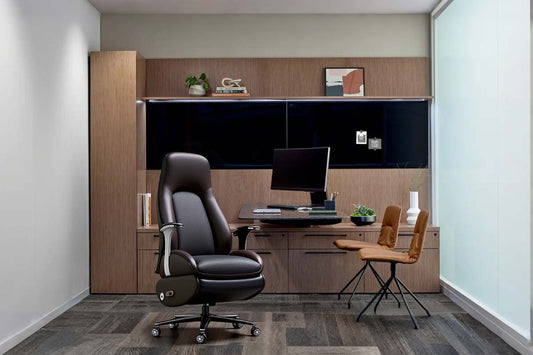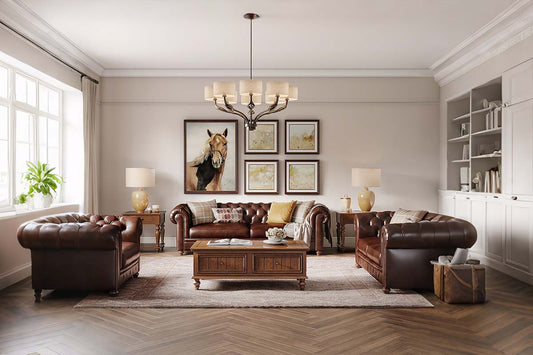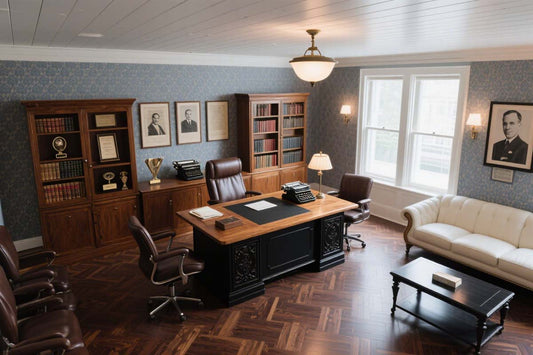
Leather Office Chair Power: Lessons From Albanese’s China Visit
Share
In diplomacy as in the office, a chair is never just a chair. It represents hierarchy, respect, and unspoken influence. As Australian Prime Minister Anthony Albanese’s recent visit to China showed, the way leaders are seated can quietly reflect the current state of international relations. Likewise, in our workplaces, the seat we occupy silently communicates status, trust, and recognition. Whether you're seated across from a client or leading a board meeting, your chair says more than you think.
In July 2025, Australian Prime Minister Anthony Albanese’s visit to China drew plenty of media attention, particularly over the seating arrangements with Chinese leaders Xi Jinping, Li Qiang, and Zhao Leji.

Why Do Executive Office Chairs Hold Such Importance in Diplomacy and Workspaces?
In international diplomacy, seating arrangements are often used as subtle expressions of power. Consider the now-infamous “sofa-gate” in 2021, where European Commission President Ursula von der Leyen was left standing while male counterparts sat — sparking international criticism. Or recall the low-slung chair offered to Serbian President Vučić during a meeting with Donald Trump — a detail perceived by many as a symbolic power imbalance.
In Prime Minister Albanese’s case, the reception he received during his 2025 China trip — equal height seating, warm welcome, and symbolic chair placement — signified mutual respect and cautious cooperation. These small details echoed far beyond the photo ops, reflecting diplomatic intentions in silence.
Now, bring that logic to the workplace. Sitting in a genuine leather executive office chair doesn’t just mean you value comfort — it’s a visual cue of authority, longevity, and your role within the organization.

How Does an Executive Leather Office Chair Reflect Your Professional Identity?
Your office chair doesn’t just support your back — it supports your image. In Australia’s fast-evolving work culture, where hybrid setups and home offices are now the norm, more people are choosing office furniture that communicates status and comfort. High-back executive leather office chairs, especially those with ergonomic and massaging features, are increasingly popular not just for their utility but for what they signify: professionalism, readiness, and care for wellness.
Brands such as Temple & Webster, Fantastic Furniture, and POVIMO offer chairs that blend function with statement. A reclining leather office chair with massage capabilities says you’re not just working hard — you’re doing it in style and with respect for your health.

Can the Right Chair Elevate Workplace Ritual and Respect?
Absolutely. Just as seating someone at the head of the table implies leadership, offering guests or employees subpar seating — like a plastic task chair or one without lumbar support — can feel dismissive, even if unintentional. Seating becomes part of what we call “workplace ceremony” — the little rituals that shape office culture, like who gets the high-back chair in a conference room, or which chair faces the door in a manager’s office.
In a professional setting, offering a comfortable ergonomic office chair with high-quality cushioning and breathable fabric, or better yet, leather, elevates not just physical experience but also perceived respect. It's the workplace equivalent of a diplomatic red carpet.

What Are Australians Choosing for Leather Office Chairs at Home and in the Office Today?
With growing awareness of back health and posture, Australians are shifting toward comfort-forward yet authoritative chair models. This includes options like:
- Massage executive office chairs — ideal for reducing long-day fatigue
- Ergonomic leather chairs with adjustable lumbar and leg rests
- Stylish white or brown leather office chairs that suit modern home décor
These choices aren’t just about aesthetics — they’re about creating an environment that supports performance and projects credibility. Whether in Melbourne, Sydney, or Brisbane, professionals are investing more in long-term solutions for physical health and workplace image.
So, What Does Your Chair Say About You?
From the world stage to the home office, chairs are never neutral. They reflect identity, status, and intention. A carefully chosen chair tells clients, colleagues, and even yourself that you take your role seriously. It’s no longer about simply “having a place to sit” — it’s about understanding the philosophy of presence, respect, and poise.
If you’re still using a budget chair with plastic wheels and flat padding, ask yourself: is this the message I want to send?



